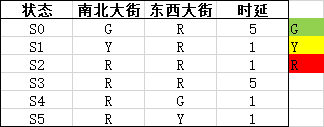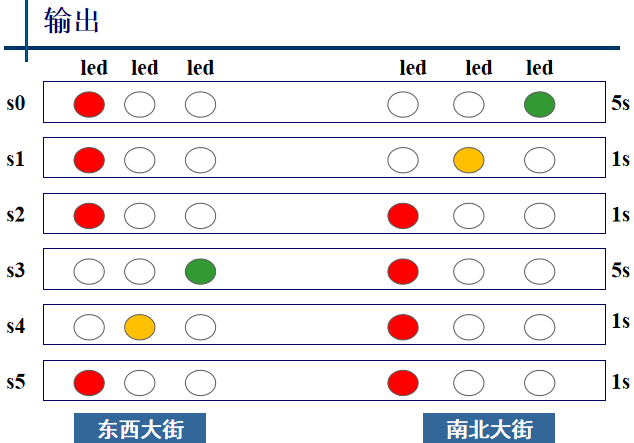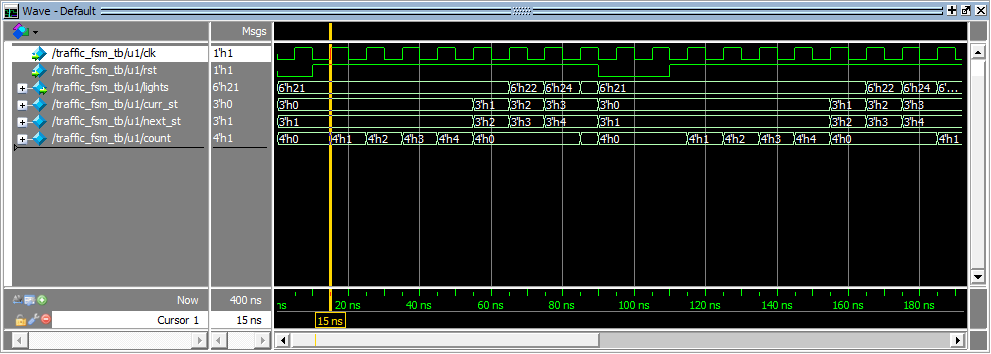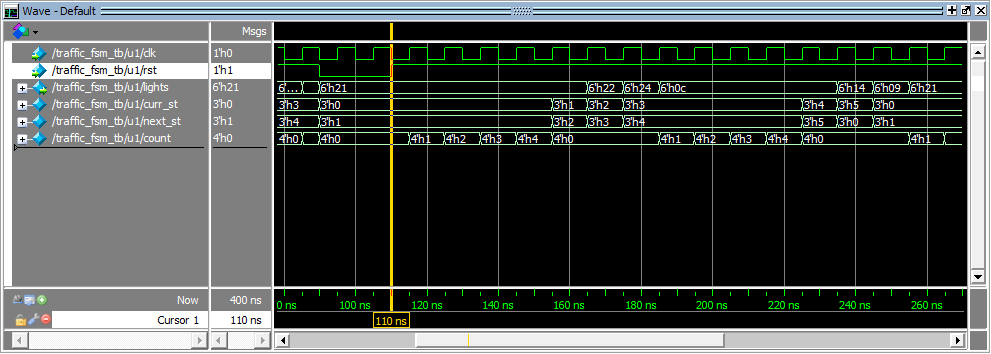Verilog利用状态机实现交通灯控制
- 状态机
- 状态表
- 状态图
- 输出
- 代码实现
- 功能模块
- 测试模块
- 仿真波形
状态机
在一些应用中,通常希望产生任意的状态序列,并且每个状态停留任意时间。采用状态机的设计思想实现。
举例:交通灯
状态表

状态图

输出

代码实现
lights[5:0]:GYR_GYR
哪个亮,对应位置1
功能模块
module traffic_fsm (lights, clk, rst);
input clk, rst;
output [5:0] lights;
wire clk, rst;
reg [5:0] lights;
// define reg
reg [2:0] curr_st;
reg [2:0] next_st;
reg [3:0] count;
// define state
parameter s0 = 3'b000;
parameter s1 = 3'b001;
parameter s2 = 3'b010;
parameter s3 = 3'b011;
parameter s4 = 3'b100;
parameter s5 = 3'b101;
// define lights
parameter light0 = 6'b100_001;
parameter light1 = 6'b100_010;
parameter light2 = 6'b100_100;
parameter light3 = 6'b001_100;
parameter light4 = 6'b010_100;
parameter light5 = 6'b100_100;
// define time delay
parameter delay5 = 5;
parameter delay1 = 1;
// 产生一个可能的状态变化
always @ (posedge clk or negedge rst) begin
if (!rst) begin
curr_st <= s0;
count <= 0;
end
else
// curr_st = next_st;
begin
if (curr_st == s0 | curr_st == s3)
if (count < delay5 - 1)
count <= count + 1;
else begin
curr_st <= next_st;
count <= 0;
end
else if (curr_st == s1 | curr_st == s2 | curr_st == s4 | curr_st == s5) begin
curr_st <= next_st;
count <= 0;
end
end
end
// 产生下一个状态的组合逻辑
always @ (curr_st) begin
case (curr_st)
s0:
next_st <= s1;
s1:
next_st <= s2;
s2:
next_st <= s3;
s3:
next_st <= s4;
s4:
next_st <= s5;
s5:
next_st <= s0;
default: begin
next_st <= s0;
end
endcase
end
// 产生输出lights的组合逻辑
always @ (posedge clk or negedge rst) begin
if (!rst) lights = light0;
else
case (curr_st)
s0: lights = light0;
s1: lights = light1;
s2: lights = light2;
s3: lights = light3;
s4: lights = light4;
s5: lights = light5;
default: lights = light0;
endcase
end
endmodule
测试模块
// testbench of 'traffic_fsm'
module traffic_fsm_tb;
reg clk, rst;
wire [5:0] lights;
traffic_fsm u1 (.lights(lights), .clk(clk), .rst(rst));
initial begin
clk = 0;
rst = 0;
#10 rst = 1;
#80 rst = 0;
#20 rst = 1;
end
always #5 clk = ~clk;
endmodule
仿真波形


在第一个always块中产生下一个状态,写的不简洁
最后
以上就是香蕉睫毛最近收集整理的关于Verilog状态机实现交通灯控制的全部内容,更多相关Verilog状态机实现交通灯控制内容请搜索靠谱客的其他文章。
本图文内容来源于网友提供,作为学习参考使用,或来自网络收集整理,版权属于原作者所有。








发表评论 取消回复